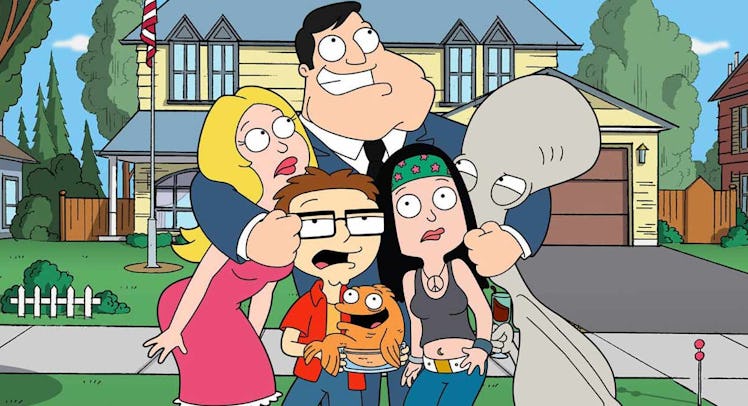‘American Dad’ Is Still the Funniest Show About American Dads
The show, which resumes its 14th season tonight, is one of the sharpest animated comedies around.

It’s pretty incredible that American Dad, which resumes its 14th season tonight on TBS, has lasted into its teenage years. From the outside, it very clearly looks like a dumbass show: a cartoon sitcom by the guy who made Family Guy, starring the guy who made Family Guy, with the same animation style and the same general conceit. There’s this traditional American family, with a mother, a father, a nerdy brother, a rebellious sister, and an evil alien man-baby in place of Family Guy’s evil baby-man. Everyone’s kind of an incompetent buffoon, though they smarten up when the story demands, and also there’s a talking pet. In theory, it reads like a cynical, uninspired cash-grab by Seth Macfarlane, a creator-star who probably could’ve sold a TV adaptation of the phone book back in 2005. In practice, however, American Dad remains one the sharpest animated comedies of our time.
There are probably a dozen or so reasons for this and they are all some form of “the writers wrote it better.” At the heart of it, though, is an intellectual curiosity which seems to have forever evaded Family Guy, which achieved Flanderization almost right out the gate. American Dad has never been content to let either its characters or its storytelling grow staid.
Stan, the titular American dad, was originally written as a staunchly conservative emblem of the Bush years; early plots centered around his religion, his xenophobia, his insistence on traditional family values and so forth. Over time his conservatism receded into the background, allowing Stan to grow in ways most animated characters do not. The joke for many early seasons is that Stan hates Jeff, his daughter’s pothead boyfriend. When he nearly dies after a seventh-season conflict with his wealthier brother, Stan finally accepts Jeff into his heart — an emotional development that only causes him more grief two seasons later, when Jeff discovers that Roger is an alien and Stan must kill one of them to protect the family (The CIA, Stan’s employer, is perpetually hunting down Roger; it’s a whole thing.) American Dad is a cartoon full of moral dilemmas that are distinctly un-cartoonish. When Stan competes with a time-traveling cyborg version of himself to win back his wife Francine in season five, it seems entirely plausible that he might lose. American Dad is not afraid of reinventing itself.
The sci-fi component is a huge part of this. Stan’s role as a CIA officer (giving him access to wild adventures and futuristic technology) and Roger’s role as a genderless pansexual alien (…ditto) open the door to incredible flights of narrative fancy, more on par with Rick & Morty or Futurama than traditional family cartoon sitcoms like Bob’s Burgers or The Simpsons. American Dad travels through space, time, virtual reality and whimsical fantasy worlds.
The show’s core concerns remain grounded throughout: Stan’s constant struggle to protect his wife and children without stripping them of any agency; Francine’s quest to have a rich, satisfying life outside of the house; Steve’s hapless attempts to figure out what, exactly, it is to be a man; Hayley’s insistence on making the world a better place for everyone, not just their family. And then, yes, there’s Roger, American Dad‘s wild card and certainly its funniest character. With his ever-shifting costumes, wigs, and personalities, Roger gives American Dad the power to change genre on a whim, leaping from noir crime drama to after school special to Comedy Central roast to tense psychological thriller. His dialogue is pretty reliably the funniest in the show, chaotic and childish yet improbably detailed. Like Charlie on It’s Always Sunny in Philadelphia, Roger is one of those rare sitcom characters who is written within clearly defined parameters but is still totally unpredictable.
Closely related to Roger’s shape-shifting is American Dad’s broader formal experimentation. Once or twice a season the writers throw the playbook out the window and adopt another form, as in “Blood Crieth Unto Heaven,” an O’Neil-style well-made play; “Rapture’s Delight,” basically a short sci-fi/fantasy film; and “Hot Water,” a horror-musical guest-starring Cee Lo Green. Episodes like these, always peppered with delicious visual flourishes and whip-smart humor, prove that it is indeed possible for old characters to have new adventures, be they in the home or in some distant galaxy.
Oh — and remember how funny Patrick Stewart was in Logan? Well, he’s been doing that in American Dad for more than a decade now as Deputy Director Avery Bullock. It’s truly something else.
American Dad is like any good American family: always evolving, always transforming to meet the demands of society as they fight through actual problems and embrace their dysfunctionality.